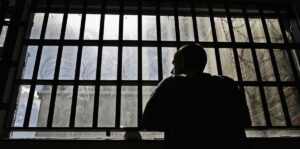
ST. MAARTEN — As St. Maarten and many other nations issue mandatory stay-home orders, an issue arises where many are struggling to remain in the same environment for a prolonged period of time.
For some it’s uncomfortable, abusive or depressing. These lockdowns or self isolations can sometimes mimic the effect of being in jail.
Anthony Hyiam is a former prisoner who spent 18 months behind bars in St Maarten and shared his experience of having his freedom taken.
Hyiam stayed in the Pointe Blanche prison and endured confinement in a rundown St. Maarten prison that has been further damaged due to Hurricane Irma. According to one current inmate who asked to remain anonymous, the bars are rusty, the walls are deteriorating and there have been pest infestations. Hyiam spent most of his time in self reflection as a coping mechanism to pass the time behind bars. While television and gaming stations are available, Hyiam said that there is no real recreational or rehabilitative activities besides a GED program.
He advises those currently facing a lockdown or curfew to make observations of the life around them. “Self reflection I think is one of the most important ways to use the time you have. When you’re working on yourself mentally it’s a continuous process.” He also spent time reading, in lieu of the limited activities available. In Hyiam’s case, getting incarcerated taught him how to adapt to changes. He went from being on the streets to getting behind a police car, registering at the station and sleeping in a cell.
Hyiam says getting through a lockdown, while also avoiding procrastination, is to act with urgency. He stayed motivated after getting released and quickly got his life together. He moved to the Netherlands where he is now pursuing higher education.
The anonymous prisoner said that being locked up made him realize the terrible feeling of missing time with family and other life opportunities. He said he knew that it’s time that cannot be regained, and he stays focused to elevate himself mentally and better himself. He advised people to be careful of getting caught up with social media.
He said he doesn’t socialize much in the prison but maintains amicable relationships with people he’s familiar with. “Point Blanche is a very inhumane place to be. It’s like survival of the fittest in here.”
The Point Blanche prison is located on the highest hill in a middle- and upper-class community. It recently received a facelift due to the hurricane damage but plans to repair and rebuild it have been prolonged. According to the anonymous prisoner, “It’s way different on the inside.” He expressed great dissatisfaction with the facility management. Each day at 5 p.m. inmates are placed on lockdown until morning and there aren’t enough activities to rejuvenate their minds and bodies besides lifting weights and a filthy basketball court. Inmates are allowed to be outside for an hour in the day and an hour in the afternoon.
Psychologist and natural health worker Tasheena Maccow Thomas says that communication in times of isolation is helpful. The pressure of mental illness increases with limited freedom to roam. She advises planning one’s day, restructuring one’s environment or online socializing with others to cope with distancing. However, prisoners are bound by the decisions of guards and prison directors. Because of the conditions at the prison, the prisoner said that there’s a lot of built-up anger among inmates. “To become a better man in such an inhumane environment takes a lot of will power,” he said.
In regard to the public population that’s currently in lockdown, both men said that complaining about matters you cannot change is ineffective. When Hyiam got released from prison it was like a culture shock. He also noticed how easy it was to fall back into the activities that got him arrested in the first place.
There was a rush to do so much and he referenced the need to adapt a systemic model from the Netherlands where felons can go home on weekends while serving their final year to slowly reintroduce them to society. Given his experience Hyiam thinks it’s best to slowly reopen services to the public in order to calmly adapt them to building a routine for their “new: regular lives. He reinforced his message of support for self-reflecting as a means of overcoming solitude.
“Over-thinking is thinking of things you cannot change; self reflection is assessing the things you can change,” he said.